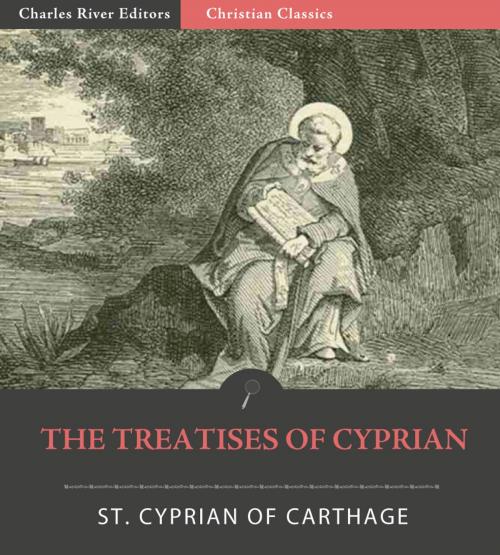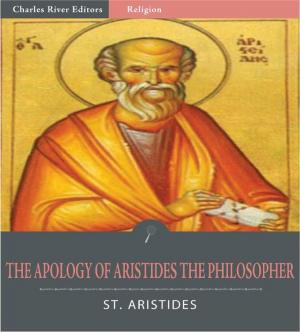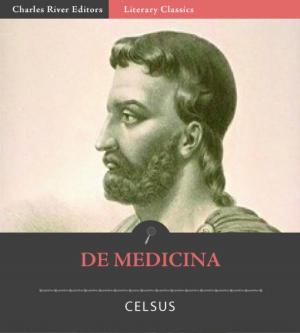The Treatises of St. Cyprian
Nonfiction, Religion & Spirituality, Christianity, Church, Church History| Author: | St. Cyprian of Carthage | ISBN: | 9781475301915 |
| Publisher: | Charles River Editors | Publication: | March 1, 2012 |
| Imprint: | Language: | English |
| Author: | St. Cyprian of Carthage |
| ISBN: | 9781475301915 |
| Publisher: | Charles River Editors |
| Publication: | March 1, 2012 |
| Imprint: | |
| Language: | English |
Saint Cyprian (died September 14, 258) was bishop of Carthage and an important Early Christian writer, many of whose works are still extant. He was born the beginning of the 3rd century in North Africa. He was of a wealthy and distinguished pagan background. In fact, the site of his eventual martyrdom was his own villa. Before becoming a Christian, he was an orator, "pleader in the courts", and a teacher of rhetoric. The date of his conversion is unknown, but after his baptism about 245248 he gave away a portion of his wealth to the poor of Carthage, as befitted a man of his status. His original name was Thascius; he took the additional name Caecilius in memory of the presbyter to whom he owed his conversion. In the early days of his conversion he wrote an Epistola ad Donatum de gratia Dei and the Testimoniorum Libri III that adhere closely to the models of Tertullian, who influenced his style and thinking. At the end of 256 a new persecution of the Christians under Emperor Valerian I broke out, and both Pope Stephen I and his successor, Pope Sixtus II, suffered martyrdom at Rome. In Africa Cyprian courageously prepared his people for the expected edict of persecution by his "De exhortatione martyrii," and himself set an example when he was brought before the Roman proconsul Aspasius Paternus (August 30, 257). He refused to sacrifice to the pagan deities and firmly professed Christ. On September 13, 258, he was imprisoned at the behest of the proconsul, Galerius Maximus. The following day he was sentenced to die by the sword. His answer was "Thanks be to God!" The execution was carried out at once in an open place near the city. A vast multitude followed Cyprian on his last journey. He removed his garments without assistance, knelt down, and prayed. After he blindfolded himself, he was beheaded by the sword. The Treatises of St. Cyprian is a collection of 12 Treatises authored by Cyprian.
Saint Cyprian (died September 14, 258) was bishop of Carthage and an important Early Christian writer, many of whose works are still extant. He was born the beginning of the 3rd century in North Africa. He was of a wealthy and distinguished pagan background. In fact, the site of his eventual martyrdom was his own villa. Before becoming a Christian, he was an orator, "pleader in the courts", and a teacher of rhetoric. The date of his conversion is unknown, but after his baptism about 245248 he gave away a portion of his wealth to the poor of Carthage, as befitted a man of his status. His original name was Thascius; he took the additional name Caecilius in memory of the presbyter to whom he owed his conversion. In the early days of his conversion he wrote an Epistola ad Donatum de gratia Dei and the Testimoniorum Libri III that adhere closely to the models of Tertullian, who influenced his style and thinking. At the end of 256 a new persecution of the Christians under Emperor Valerian I broke out, and both Pope Stephen I and his successor, Pope Sixtus II, suffered martyrdom at Rome. In Africa Cyprian courageously prepared his people for the expected edict of persecution by his "De exhortatione martyrii," and himself set an example when he was brought before the Roman proconsul Aspasius Paternus (August 30, 257). He refused to sacrifice to the pagan deities and firmly professed Christ. On September 13, 258, he was imprisoned at the behest of the proconsul, Galerius Maximus. The following day he was sentenced to die by the sword. His answer was "Thanks be to God!" The execution was carried out at once in an open place near the city. A vast multitude followed Cyprian on his last journey. He removed his garments without assistance, knelt down, and prayed. After he blindfolded himself, he was beheaded by the sword. The Treatises of St. Cyprian is a collection of 12 Treatises authored by Cyprian.















